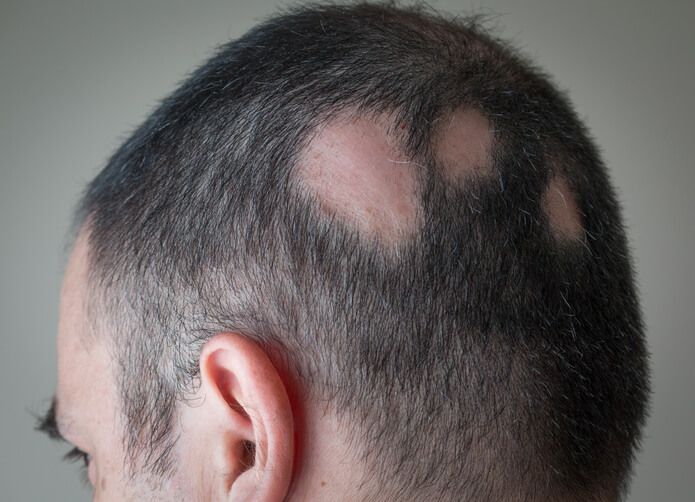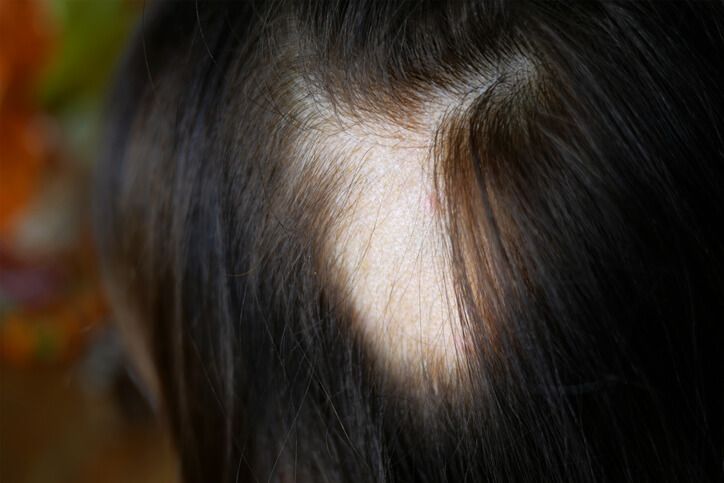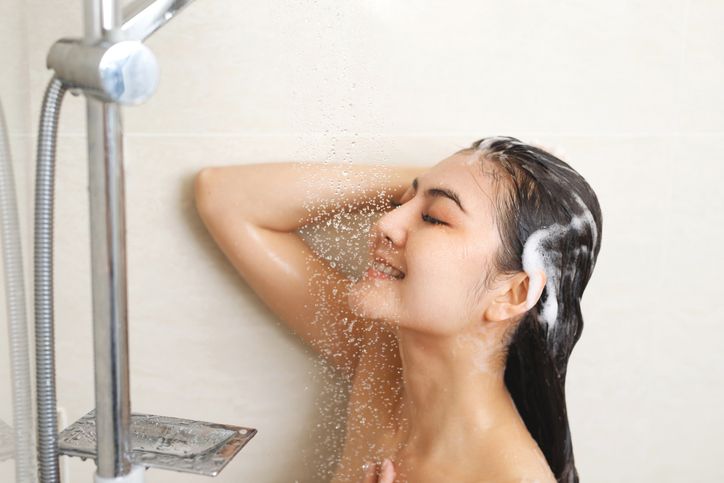
- Home
- Trend
- Weight Loss Strategies
- Acne Tips
- Hair Health Information
- Blemish Removal Tips
- Acne Scar Removal Tips
- Muscle Building Techniques
- Intimate Care Tips
- Postpartum Intimate Care
- Eye Bags Wiki
- Tips for Face Slimming
- Secret of Permanent Hair Removal
- Breast Enlargement Tips
- Cure to Snoring
- Marionette Lines
- Skin-Tightening Secrets
Hair loss is scary enough—but alopecia areata (also called “ghost shaving”) is even scarier! Imagine waking up and suddenly noticing a coin-sized bald patch on your scalp. Since it doesn’t hurt or itch, people often only discover it after a significant portion of hair is already gone. Left unchecked, it could even spread and lead to full baldness. What should you do if you develop alopecia areata? What causes this sudden hair loss? This guide explores everything you need to know—from causes and misconceptions to effective treatment and dietary advice to help you recover and prevent recurrence.
What Is Alopecia Areata? What Are Its Characteristics?

Alopecia areata—also known as “ghost shaving” or “circular baldness”—is a type of hair loss that’s different from more common issues like male pattern baldness or diffuse thinning. The affected area is typically small and patchy, often round or oval-shaped, similar in size to a coin. In more severe cases, hair loss can spread beyond the scalp to the eyelashes, eyebrows, and body hair.
At first, the bald spot may be only 1–2 cm in diameter. But over time, it can expand, and the surrounding hair often becomes thin and falls out. In most cases, alopecia areata resolves on its own within a few months to a year, with new hair slowly growing back. However, some individuals may not recover without treatment.
Current studies show that alopecia areata can affect anyone regardless of age or gender, but it is most common among those aged 20 to 40. Men and women are equally susceptible.
What Causes Alopecia Areata?

Alopecia areata can drastically affect a person's appearance and, if left untreated, may worsen into more severe baldness. Understanding the root cause is key to choosing the right treatment and recovering effectively.
Western Medicine Perspective:
The exact cause of alopecia areata is still unknown, but growing evidence points to autoimmune dysfunction. The immune system mistakenly identifies hair follicles as foreign invaders and attacks them, triggering inflammation and leading to sudden hair loss. External factors such as stress, poor sleep, and chronic fatigue can also disrupt immune function and contribute to alopecia.
Traditional Chinese Medicine (TCM) Perspective:
According to TCM, “hair is the surplus of blood,” meaning hair health is tied to the circulation of qi (vital energy) and blood. When organs like the liver and heart are out of balance—due to stress, overwork, or irregular lifestyle—qi and blood can become deficient or stagnated, preventing hair from receiving adequate nourishment and leading to patchy hair loss.
TCM identifies three common patterns associated with alopecia areata:
• Excess Heat in the Blood: Irritability and a “hot” temperament can create internal heat that disturbs the liver and heart, disrupting the flow of qi and blood and depriving the scalp of nutrients.
• Blood Stasis: Poor circulation can cause headaches and eventually prevent nutrients from reaching the scalp, leading to localised hair loss.
• Qi and Blood Deficiency: Often seen after illness or childbirth, when the body is weakened and nutrients fail to reach the scalp, resulting in sparse, brittle hair and patchy shedding.
免費體驗
F8 Hair Regrowth Treatment
1 Minute Self-Registration
Date should not be before minimal date
Who Is Most at Risk for Alopecia Areata?
Roughly 1 in 1,000 people develop alopecia areata. While anyone can be affected, combining insights from both Western and Chinese medicine, the following traits increase susceptibility:
• High stress levels
• Poor sleep or extreme fatigue
• Weak immune system
• Postpartum or post-illness recovery
• Autoimmune conditions
Common Myths About Alopecia Areata
When people spot a bald patch, panic often sets in, leading to desperate (and sometimes misguided) attempts to regrow hair. Here are two widespread misconceptions:
Myth 1: Alopecia Areata Is Contagious
Many fear they might pass it to others—but alopecia areata is an autoimmune disorder triggered by internal factors like stress, not a contagious disease. You cannot infect others.
Myth 2: Applying Brandy Can Cure It
A popular folk remedy involves rubbing brandy on the scalp to “stimulate” blood flow. But there’s no scientific proof that alcohol promotes hair growth—and it can irritate or damage the scalp, making the problem worse. Avoid unproven home remedies.
How Can You Improve Alopecia Areata?
Though not life-threatening, alopecia areata can take a toll on confidence. With proper care, most people can regrow healthy hair. Here’s what you can do:
• Manage Stress: Chronic stress disrupts immune function. Try relaxation methods like yoga, meditation, or regular exercise to stabilise mood and reduce emotional fluctuations.
• Eat a Balanced Diet: Hair is made of protein, so it’s vital to get enough protein, vitamins, and minerals. Antioxidant-rich berries (like blueberries and strawberries) and omega-3-rich fish (like salmon and trout) help support scalp health.
• Supplement with Vitamin D: Vitamin D plays a role in forming new hair follicles and maintaining thickness. Many people with autoimmune conditions are deficient, so a modest supplement can help.
• Get Enough Sleep: Sleep supports cell repair and metabolism. From a TCM perspective, 11 p.m. to 3 a.m. is prime time for liver and gallbladder recovery—vital for healthy qi and blood circulation.
免費體驗
F8 Hair Regrowth Treatment
1 Minute Self-Registration
Date should not be before minimal date
Western Medical Treatments for Alopecia Areata
Western medicine typically treats alopecia areata with the following approaches:
• Topical Steroids: For small patches, corticosteroid injections are often effective. 50–90% of patients respond well, though side effects can include skin thinning, folliculitis, and broken capillaries.
• Minoxidil: Often used in combination with steroids, this hair-growth solution is applied twice daily and can help stimulate regrowth in bald patches.
• Topical Immunotherapy: For moderate to severe cases, applying sensitising agents can modulate the immune response and restore follicle activity. Studies show up to 80% efficacy.
• Oral Steroids: In severe or widespread cases, high-dose steroids may be needed for 3–6 months. Long-term use may lead to side effects like gastrointestinal issues, hypertension, or elevated blood sugar.
TCM Treatments for Alopecia Areata
In TCM, healthy hair reflects a healthy liver and kidney system. Treatment starts by identifying the patient's constitution and addressing imbalances through:
• Herbal Medicine: Common prescriptions aim to tonify the liver and kidney, promote blood flow, and dispel internal wind. This strengthens follicles and prevents further shedding.
• Acupuncture (Seven-Star/Plum Blossom Needle): This method involves gently tapping bald areas and specific acupoints with a star-shaped needle to improve blood flow and stimulate follicle activity.
Dietary Remedies for Alopecia Areata
Complement TCM treatments with nourishing meals to support hair regrowth:
• Goji & Black Sesame Congee: Boil goji berries, black sesame seeds, and rice for a nourishing porridge. It supports kidney and liver health and enriches blood.
• Sesame Kelp Jelly: Toast white sesame seeds and grind into powder. Mix with kelp and a bit of starch, then steam into a jelly. Nutritious and delicious!
免費體驗
F8 Hair Regrowth Treatment
1 Minute Self-Registration
Date should not be before minimal date
Regrow Hair with Perfect Medical’s F8 Hair Regrowth Treatment
Struggling with hair loss? Let the professionals help. The Perfect Medical F8 Hair Regrowth Treatment for women uses medical-grade low-level soft laser technology to stimulate melanin absorption deep within the follicles. This reactivates hair follicles, boosts scalp circulation, and encourages healthy regrowth—perfect for those with alopecia areata.
The treatment follows a 3-step concept: Nourish, Activate, Regrow. It begins by purifying scalp pores and removing buildup. Then, laser therapy delivers potent nutrients to repair follicles. Finally, growth serums activate stem cells, regenerate blood vessels, and rebuild scalp structure, promoting thicker, healthier hair.
Unlike surgical hair transplants, the F8 treatment is non-invasive, pain-free, and requires no downtime—perfect for busy urban women. It uses 650nm LLLT (low-level laser therapy), clinically proven to treat hair problems with visible results. You can return to work or school right after.
Free trials are now available—click the link below to book your appointment!
Book it Now: Perfect Medical F8 Hair Regrowth Treatment免費體驗
F8 Hair Regrowth Treatment
1 Minute Self-Registration
Date should not be before minimal date
FAQ

Can alopecia areata heal on its own?
In most cases, alopecia areata resolves on its own within six months to a year after the onset of hair loss. However, the regrown hair tends to be finer, and it may come back white. That’s why it’s important to start scalp care and maintenance as soon as symptoms appear. Early care supports healthy regrowth and aids the regeneration of hair matrix cells.
What causes alopecia areata?
From a Western medical perspective, the exact cause of alopecia areata is not fully understood. However, increasing research suggests that it’s linked to immune system dysfunction. The body’s lymphocytes mistakenly identify hair follicles as foreign invaders and attack them, causing inflammation in the scalp and resulting in abnormal hair loss. External factors also play a role in triggering the condition. Stress, sleep deprivation, chronic fatigue, and other unhealthy lifestyle habits can all disrupt immune balance, contributing to the onset of alopecia areata.
How can alopecia areata be improved?
Start by stabilizing your emotions—stress negatively impacts immune coordination. Maintaining emotional balance and a calm mindset in daily life can significantly reduce the chances of hair loss. A well-balanced diet is also crucial. Since protein is the main component of hair, it’s important to consume enough protein, along with vitamins and minerals. Fruits rich in antioxidants, such as berries, and omega-3-rich fish like salmon and trout, are especially beneficial. Sleep is another key factor. While you sleep, the body repairs cells and boosts metabolism. Quality sleep also helps repair damaged hair and ensures the scalp receives enough nutrients. Aim for sufficient rest every night. Lastly, vitamin D deficiency can affect both skin and hair health. Vitamin D supports the formation of new hair follicles and helps maintain hair thickness, preventing premature shedding. Many people with autoimmune disorders—including alopecia areata—are found to have low vitamin D levels. Supplementing appropriately can help improve symptoms of alopecia areata.
How is alopecia areata treated in Western medicine?
For mild cases with small bald patches, corticosteroid injections are the most common treatment. Around 50% to 90% of patients experience positive results, with most regrowing hair successfully. Minoxidil is often used in conjunction with corticosteroids. Applied to the affected area twice daily, it helps stimulate new hair growth. For more severe cases, topical immunotherapy may be recommended. This involves applying sensitizing agents to the scalp to regulate immune responses and restore normal hair follicle function. Studies show this treatment has an efficacy rate of up to 80% in moderate to severe cases. In the most extreme cases—where hair loss is widespread across the body—high-dose oral steroids may be prescribed for 3 to 6 months. However, long-term steroid use can lead to various side effects, such as gastrointestinal discomfort, high blood pressure, and elevated blood sugar.
What is the recommended treatment to improve alopecia areata?
The Perfect Medical F8 Hair Regrowth Treatment for women uses medical-grade soft laser technology to penetrate deep into the hair follicles. This laser energy is absorbed by the melanin in the follicle roots, reactivating dormant follicles and stimulating regeneration. It also promotes blood circulation in the scalp, making follicles and dermal papillae healthier and encouraging new hair growth—especially for those suffering from alopecia areata. This treatment follows a three-step concept: Nourish, Activate, Regrow. First, it nourishes by deeply cleansing the scalp and removing buildup and chemical residue. Then, it activates through medical-grade laser therapy, delivering potent hair-boosting factors to accelerate cell renewal and restore follicle vitality. Finally, it regrows by applying powerful hair growth serums that activate stem cells in the scalp, regenerate blood vessels and skin cells, and rebuild a strong, healthy scalp environment—truly improving scalp health and addressing issues like alopecia areata. Unlike hair transplant surgery, the F8 treatment is non-invasive and requires no downtime. It uses 650nm low-level laser therapy (LLLT), clinically proven to be effective for hair issues. It’s 100% painless and non-damaging, allowing women to return to work or daily routines right after treatment—perfect for busy urban lifestyles!








